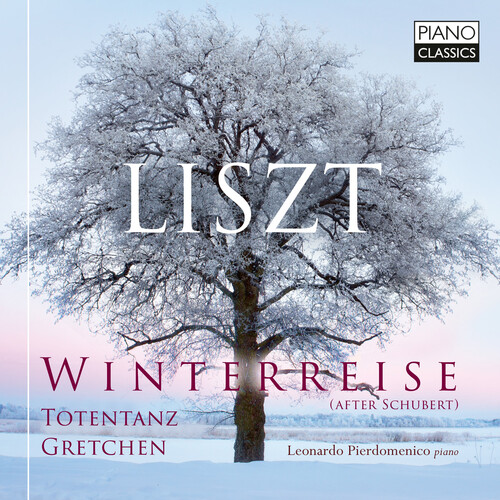Show results for
Deals
- 4K Ultra HD Sale
- 50s Films Sale
- Action Sale
- Alternative Rock Sale
- Anime sale
- Award Winners Sale
- Bear Family Sale
- Blu ray Sale
- Blues on Sale
- British Sale
- Christmas in July
- Classical Music Sale
- Comedy Music Sale
- Comedy Sale
- Country Sale
- Criterion Sale
- Drama Sale
- Electronic Music sale
- Folk Music Sale
- Horror Sci fi Sale
- Kids and Family Sale
- Metal Sale
- Music Video Sale
- Musicals on Sale
- Mystery Sale
- Naxos Label Sale
- Page to Screen Sale
- Paramount Sale
- Rap and Hip Hop Sale
- Reggae Sale
- Rock
- Rock and Pop Sale
- Rock Legends
- Soul Music Sale
- TV Sale
- Vinyl on Sale
- War Films and Westerns on Sale

Winterreise (After Schubert) Totentanz Gretchen
- Format: CD
- Release Date: 6/23/2023

Winterreise (After Schubert) Totentanz Gretchen
- Format: CD
- Release Date: 6/23/2023
- Composers: Franz Liszt
- Label: Piano Classics
- UPC: 5029365102513
- Item #: 2563767X
- Genre: Classical
- Release Date: 6/23/2023

Product Notes
While Liszt's version of 12 songs from Winterreise is the crowning glory of his Schubert transcriptions, there are surprisingly few recordings of the complete set. Only two are presently available (one on fortepiano), making this new recording by Leonardo Pierdomenico a notable event, and coupled uniquely with two versions of Liszt's own music. The young Italian pianist has already established himself as a Lisztian of renown and distinction through the Piano Classics album (PCL10151) including the Ballades, Legendes and Csardas macabre. The album won widespread critical admiration: 'Would that half the seasoned Lisztians I know had Pierdomenico's keen ear for stylistic differentiation within this half-century of repertory. His highly developed technique and cultivated sound, both adaptable to a variety of affects, are wedded to those twin essentials for artistic Liszt-playing: imagination combined with thoroughgoing, scrupulous musicality.' (Gramophone, September 2018). Leonardo Pierdomenico now brings these Lisztian virtues to the songs from Winterreise which Liszt selected and arranged according to his own ordering, beginning like the original with 'Gute Nacht' but ending with the grim tavern scene of 'I'm Dorfe'. Along the journey, Liszt exercises all his powers of pianistic invention not merely to incorporate the song line within the piano part but to enrich Schubert's music with his own sympathetic interpretation. In Der Lindenbaum, Liszt he deploys all manner of flourishes to conjure up the tree's rustling leaves. In a surprising twist, he follows it with the cycle's otherwordly song evoking Der Leiermann, the hurdy-gurdy man. The recital's still central point of reflection is supplied by Liszt's transcription of Gretchen from his Faust Symphony: a loving but complex portrait of the object of Faust's affections, a cantabile meditation magnificently sustained over almost 20 minutes. By contrast, Totentanz in it's solo-piano version is a feat of pianistic imagination, based on the Dies Irae plainchant, to test the most technically assured performers. Authoritative notes by the pianist and scholar Mark Viner complete a set sure to draw the interest of all Lisztians.

